Lecture
education as a value and public good;
education as a process combining the upbringing and training of a person;
education as a result of education, training, development of a person, satisfaction of his educational needs and interests.
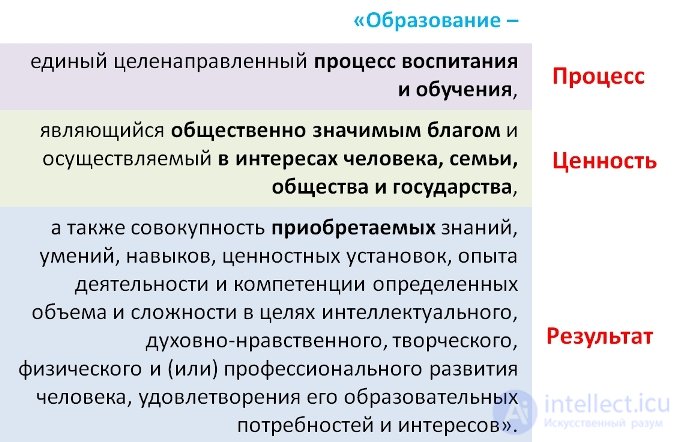
Fig. 3.1. Procedural, value and effective aspects of education
The implementation of the value, procedural and effective aspects of education is carried out in their unity. Education as a social phenomenon has existed since ancient times, it is due to the social need to pass on to new generations the experience accumulated by previous generations, to create the prerequisites for the improvement and development of this experience, for the stability of society. Education has been reproduced and developed over many centuries, the modern level of education is just another stage of its development. The reproduction and development of education requires large resources, it is carried out in the activities of many people, institutions, organizations, using a variety of means.
Therefore, among the meanings of the term education, there is one more thing: education as a complex system of interactions between subjects and material resources, providing training, education and personal development. This aspect of education reflects the concept of an education system (Fig. 3.2).
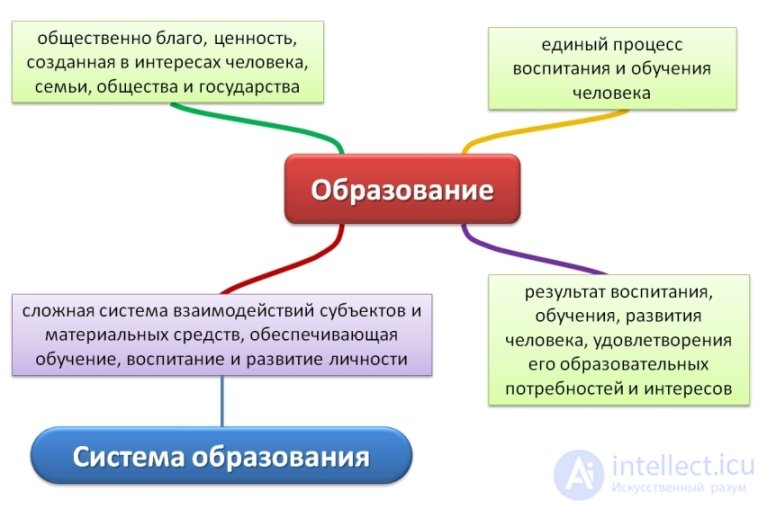
Fig. 3.2. The basic meaning of the term education
The pedagogical process is a specially organized, purposeful interaction of teachers and pupils, aimed at solving educational, educational and developmental tasks.
The teacher is a subject who organizes and directs this process. The pupil is a subject whose activity is a necessary condition for them to learn the experience accumulated by mankind in all its diversity. Teachers and pupils as subjects of activity (actors) are the main components of the pedagogical process. The components of the pedagogical process also include its goals, results, content, organization.
The experience mastered by the pupils in the activity is the content of the pedagogical process. The development of experience is most successful when using specially selected for this pedagogical methods of interaction and means in a specially organized environment. Thus, the essence of the pedagogical process consists in the interaction of teachers and pupils on a meaningful basis using various methods and means.
The interaction of the participants of the pedagogical process - teachers and pupils - is specially organized and directed by teachers to achieve this goal, therefore the goal of the pedagogical process is its system-forming factor (the factor by which the entire interaction system is organized, without which the pedagogical process cannot exist).
The purpose of the pedagogical process is detailed in pedagogical tasks. The pedagogical task is formulated as a result of understanding a specific pedagogical situation, correlated with the purpose and conditions of its implementation. The pedagogical task is the basic unit of the pedagogical process. The solution of each pedagogical task means a step towards a goal. The dynamics of the pedagogical process can be traced in the transition from solving one pedagogical problem to another.
The driving forces of the pedagogical process are based on its contradictions. The pedagogical process, due to its complexity, is very contradictory. His movement from task to task occurs as a result of resolving his contradictions. The contradictions of the pedagogical process are divided into objective (existing independently of the subjects of the pedagogical process) and subjective (resulting from the actions of subjects, for example, erroneously adopted pedagogical decisions).
Examples of contradictions:
between the integrity of the individual and the functional approach (differentiation of individual functions) to its formation;
between the individual character of personal development and the mass character of the organization of the pedagogical process;
between the defining significance of activity in the development of the personality and the predominantly verbal impact on the personality in education;
between the increasing role of humanitarian subjects in the social development of man and the increasing technologization of the pedagogical process, etc.
The most common objective contradiction is the contradiction between the possibilities of education and the requirements that society, school, and teachers place on them. This contradiction is due to the inability to meet the requirements before the objective conditions mature for this: the child will develop the necessary qualities, personality traits, expand knowledge, develop abilities. To overcome this contradiction of a personality, it is necessary to master a new experience for it, to develop the required qualities in oneself.
The modern pedagogical process is based on theories that have been formed and evolved over many centuries. Virtually any modern theory of education, training and personal development "grows" out of psychological and pedagogical ideas and concepts of the past.
The first attempts of scientific understanding of the pedagogical process were still in the ancient world. Thus, views on the upbringing of Plato, Aristotle, Socrates, Democritus, and other ancient Greek philosophers are widely known. Their ideas about the education of virtues are still relevant today.
As the science of man developed, the pedagogical theory also developed, the various directions of which were distinguished by a considerable variety. So, based on the ideas of J.-J. Rousseau formed the theory of free education , the main ideas of which consist in the non-violent formation of the child's personality, in the development of his natural inclinations. Completely different values are the basis of authoritarian education , which aims to form an obedience for the child, while the main means of education are threat, supervision, prohibition and punishment.
In the twentieth century. pedagogical systems are being actively developed in different countries, in the center of which is the educational influence of the group on the individual (J. Dewey, L. Kolberg, R. Steiner, and others). In the domestic pedagogy of the 1930-1980s. The theory of the education of the individual in a collective (AS Makarenko, S. T. Shatsky, I. P. Ivanov, V. M. Korotov, and others) became very popular.
The diversity of approaches to the essence, content and organization of the pedagogical process, created over the centuries of development of pedagogical thought, was reflected in the modern basic theories of the pedagogical process.
Modern basic theories of the pedagogical process , as a rule, are a synthesis of not only pedagogical, but also philosophical, psychological, and natural science theories. Among the most famous theories of education and personal development are pragmatism, neopositivism, neotomism, behaviorism. The common feature of these theories is their humanistic orientation, focus on the education of a free, self-developing personality.
The pragmatic theory of the pedagogical process is based on the philosophy of pragmatism (the second half of the nineteenth - the beginning of the twentieth century: C. Peer, William James, and others), which recognizes practical use as the main value. In pedagogy, the ideas of pragmatic philosophy were most successfully implemented by J. Dewey (USA), who created the original educational system (Dewey himself called it instrumentalism). The main provisions of the pragmatic theory of the pedagogical process:
- education as an adaptation to life, the connection of training and education, school and life;
- support in the educational process on children's own activity, encouragement and development of their independence;
- practical orientation and usefulness of the activities performed by children in the pedagogical process;
- the content of education must be fully determined by the interests of the child.
The main disadvantage of this theory was the neglect of systematic knowledge that in the 1960s. led to the crisis of the American school.
In the 1970s, pedagogical pragmatism was transformed into a non-pragmatic theory of upbringing and personal development, the essence of which comes down to self-affirmation of a personality and strengthens the individualistic orientation of the pedagogical process. The ideas of such prominent figures of neopragmatism as A. Maslow, C. Rogers, A. Combs, and others formed the theoretical basis of modern humanistic pedagogy. However, in neopragmatism, according to I.P. Podlasy, there is a serious drawback: the complete absence of restrictions in the development of personality in practice often leads to the inability of the individual to reckon with other people.
Neopositivism (“new positivism” or new humanism) is a philosophical-pedagogical direction, which is trying to comprehend the phenomena caused by the scientific and technological revolution. This trend was formed on the basis of the ethical ideas of Plato, Aristotle, Kant. The main provisions of the pedagogy of neopositivism (J. Wilson, L. Kolberg, etc.):
- denial of education from established ideologies, the formation of a child's rational thinking;
- humanization of the system of education, the establishment of subject-subject relations between the teacher and the pupil;
- creation of conditions for the free development of the individual, refusal to manipulate the child’s behavior.
On the development of educational theory in the twentieth century. another popular area of philosophy, existentialism, had a significant impact. Existentialism recognizes the person as the highest value of the world and proclaims the uniqueness of each person. A person is in a hostile social environment, seeking to make all people the same, so he is forced to confront it in order to preserve its uniqueness. The existentialist trend in pedagogy is represented by many schools and is distinguished by a large variety of approaches. The general feature of the existential concepts of education is a lack of confidence in the possibilities of pedagogical management of the development of the child’s personality (G. Marcel, U. Barrett, J. Kneller, etc.). The role of the teacher, according to representatives of existential pedagogy, consists primarily in creating conditions for the child in which he could develop freely.
Neo - Thomism is a religious and philosophical doctrine, named after the Catholic theologian and thinker Thomas (Toma) of Aquinas (XIII century). The main position of neo-Thomism is in the dual nature of man as the unity of his “material and spiritual entities”. The pedagogy of neo-Thomism (J. Mariten, W. McGacken, M. Casotti, etc.) affirms Christian and universal values in education (education of kindness, humanism, honesty, love of neighbor, etc.). Neo-Thomism was not widely spread in Russia, however, this theory is very popular in countries where a significant part of schools are traditionally supervised by the Roman Catholic Church (for example, in Latin American countries).
Behaviorism (from the English. Behavior - behavior) - psychological and pedagogical theory. According to this theory, the purposeful formation and development of the personality should be based on the latest achievements of the sciences of man. Classical behaviorism (J. Watson) has enriched pedagogical science with a statement about the dependence of the reaction (behavior) on the stimulus. The neo-heeviorists (BF Skinner, K. Hull, E. Tolman, and others) supplemented the “stimulus → reaction” chain with a reinforcement provision: “stimulus → reaction → reinforcement”. Behaviorism makes an important contribution to the rational organization of the pedagogical process, to the development of modern methods and technologies (one of the promising applied developments of behaviorists is programmed learning). Behaviorists emphasize the formation of a scientific world outlook, rational thinking, organization, discipline, and enterprise as important tasks of educating a modern person. An important place in the organization of the pedagogical process is given to psychological and pedagogical diagnostics, the use of computer technology for processing diagnostic data.
The historical development of the pedagogical profession has led to a distinction, and sometimes - to the opposition of the main pedagogical processes: training and education. However, the idea that "the teacher teaches, and the educator brings up" is erroneous. In the pedagogical process is the formation and development of personality, which is a holistic education. The integrity of the individual pupil objectively requires the integrity of the processes affecting her.
Since the middle of the XIX century. progressive teachers are increasingly celebrating the unity of training and education. So, I.F. Herbart wrote: “learning without moral education is a means without a goal, and moral education <...> without learning is a goal without means.” Understanding the integrity of the pedagogical process in domestic pedagogy was shaped by the idea of KD Ushinsky on the unity of the "administrative, educational and educational elements of school activities." An important contribution to the study of the pedagogical process was made by P.F. Kapterev, according to which the general education course of the school should ensure the right balance between education and upbringing in order to fully improve the personality of the citizen. In the period of the formation of Soviet pedagogy, N.K. Krupskaya, A.P. Pinkevich, S.T. Shatsky, P.P. Blonsky, M.M. Rubinstein, A.S. Makarenko. However, from the early 1930s to the mid-1970s xx. Soviet pedagogy departed from the idea of the integrity of the pedagogical process; during this period, the main efforts were directed at the in-depth study of training and education as relatively independent processes.
The scientific interest in the problem of the integrity of the pedagogical process, which reappeared in the 1970s, was reflected in the works of Yu.K. Babansky, M.A. Danilov, V.S. Ilina, V.M. Korotov, V.V. Kraevsky, B.T. Likhachev et al. The role of Yu.K. Babansky in promoting holistic perception of the pedagogical process. In the 1980s, being the author and scientific editor of university textbooks in pedagogy, he included the theory of the integral holistic pedagogical process in them.
The development of the theory of a holistic pedagogical process in the post-Soviet period is mainly related to the scientific school of V.A. Slastenin.
A holistic pedagogical process is the highest level of development of the pedagogical process, which is inherent in the unity and harmonious interaction of all its components.
Integrity is a synthetic characteristic of the pedagogical process. Thus, integrity is manifested in the continuity of education and training. However, integrity cannot be reduced to the unity of the processes of education and training or to the unity of the processes of mental, moral, labor, physical and other types of education. In fact, the integrity of a multidimensional and multidimensional, it is manifested both in the content and in the organization of the pedagogical process.
In the content plan, the integrity of the pedagogical process is realized by reflecting in the goal and content of education the interrelation of four elements:
knowledge - theoretical information containing in a generalized and systematized form the experience accumulated by mankind (including knowledge of methods of action);
skills, representing the experience of applying knowledge in the actions of ready-made algorithms;
experience of creative activity - experience of action in new situations when the algorithm is not known in advance;
experience of emotional and volitional attitude to the world around us.
Во взаимосвязи этих элементов реализуется единство основных функций педагогического процесса: образовательной, развивающей и воспитательной. Основные функции, в свою очередь, трансформируются в единство образовательных, развивающих и воспитательных задач, комплексное решение которых обеспечивает достижение цели педагогического процесса: формирования гармонично развитой личности, полезной и успешной в обществе (рис. 3.3).
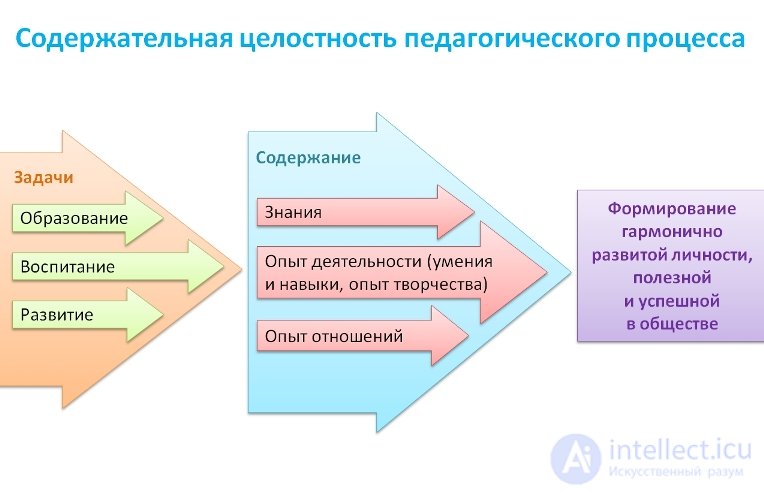
Fig. 3.3. Содержательная целостность педагогического процесса
Для решения любой из задач требуется освоение воспитанником знаний, опыта действий по алгоритмам (умений и навыков) и творчества, а также опыта отношений к окружающему миру. Let's give an example. Освоение воспитанником некоторых культурных норм и правил поведения относится к задачам воспитания. Для этого воспитанник должен освоить...
знания о сущности данных культурных норм и способах их реализации в своей деятельности и поведении;
опыт следования данным нормам в повседневной жизни (навыки, привычки, соответствующие культурным нормам);
опыт соблюдения культурных норм в новых для воспитанника условиях (для этого ему потребуется творчески интерпретировать усвоенные правила культурного поведения);
опыт уважительного отношения к окружающим людям, заложенного в осваиваемых нормах и правилах поведения.
При неполном освоении этих компонентов освоение культурной нормы будет поверхностным, а её реализация - носить ситуативный характер (например, воспитанник ведёт себя культурно лишь тогда, когда за ним наблюдает педагог).
В организации педагогического процесса свойство целостности приобретается им при обеспечении единства процессов четырёх основных видов (рис. 3.4):
процессов освоения и конструирования педагогом содержания образования, а также комплекса способов и средств его передачи воспитанникам; эти процессы имеют характер предметных отношений, поскольку педагог взаимодействует с предметами, а не с живыми участниками педагогического процесса, однако процессы педагогического освоения и конструирования необходимы для педагогической адаптации содержания образования и подготовки к эффективной реализации следующих процессов;
процессов делового взаимодействия (формального общения) педагогов и воспитанников; данный вид процессов отражает собственно педагогическое взаимодействие;
процессов личностного взаимодействия (неформального общения) педагогов и воспитанников; посредством этих процессов между педагогами и воспитанниками устанавливаются доверительные отношения, что является необходимым условием полноценного педагогического взаимодействия
процессов самостоятельного освоения воспитанниками содержания образования (самообразования и самовоспитания), в которых отношения также имеют предметных характер, однако их особенность состоит в том, что воспитанник осваивает педагогически адаптированное содержание образования, пользуясь теми способами и средствами познания, которые подобраны и оптимизированы педагогом.
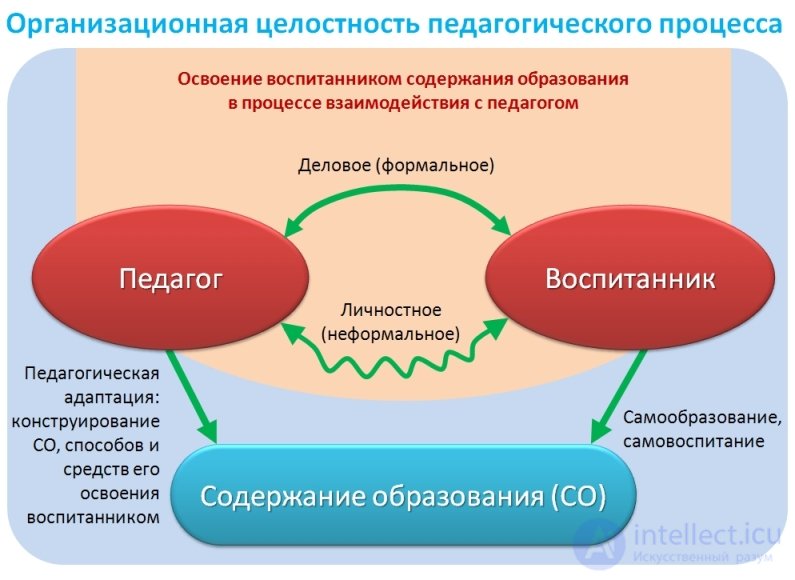
Fig. 3.4. Организационная целостность педагогического процесса
Любой из перечисленных процессов не ограничивается рамками, например, только обучения или только воспитания, их взаимосвязь охватывает весь педагогический процесс в целом.
Педагогическое взаимодействие - универсальная характеристика педагогического процесса, его основа. Педагогическое взаимодействие в широком смысле - это взаимосвязанная деятельность педагога и воспитанников. Благодаря этой деятельности и обеспечивается динамика педагогической системы и протекание педагогического процесса.
Взаимодействия, происходящие в педагогическом процессе, разнообразны: "ученик - ученик", "ученик - ученический коллектив", "ученик - учитель", "учащиеся - усваиваемые ими знания и опыт (объект усвоения)" и т.д. При этом основным отношением для педагогического процесса является взаимосвязь "деятельность педагога - деятельность воспитанника" (именно эта взаимосвязь обеспечивает взаимодействие между педагогом и ребенком). Однако, поскольку результатом педагогического процесса являются усвоенный воспитанником знания, опыт, компетенции, то и результат взаимодействия в конечном итоге определяется по отношению "воспитанник - объект усвоения".
Это определяет специфику педагогических задач, которые могут быть решены только посредством руководимой педагогом собственной деятельности детей. Таким образом, главная особенность педагогической задачи состоит в том, что результатом её решения является не правильное выполнение воспитанником требуемых действий или получение им правильного ответа, а приобретение учеником определённых свойств, качеств, овладение способами действия.
В педагогической науке существуют термины «педагогическое воздействие» и «педагогическое взаимодействие».
Педагогическое воздействие предполагает активные действия педагога в отношении воспитанника и готовность воспитанника принять их и измениться вод их влиянием. Иначе говоря, педагог в таких отношениях выступает субъектом, а воспитанник – объектом, а сами отношения являются субъект-объектными. При чёткой организации педагогическое воздействие даёт хороший эффект, однако имеет существенный недостаток: оно крайне неэффективно для формирования самостоятельности, творчества, инициативы, активной жизненной позиции – тех качеств, без которых немыслима свободная саморазвивающаяся личность (а именно такая личность является целью современного воспитания).
Педагогическое взаимодействие – это согласованная деятельность педагога и воспитанника по достижению совместных целей и результатов. При взаимодействии педагога и воспитанника они оба являются субъектами, их взаимоотношения приобретают субъект-субъектный характер. Таким образом, понятие педагогического взаимодействия гораздо шире понятия педагогического воздействия. Педагогическое взаимодействие всегда имеет два взаимообусловленных компонента: педагогическое воздействие и ответную реакцию воспитанника (рис. 3.5).
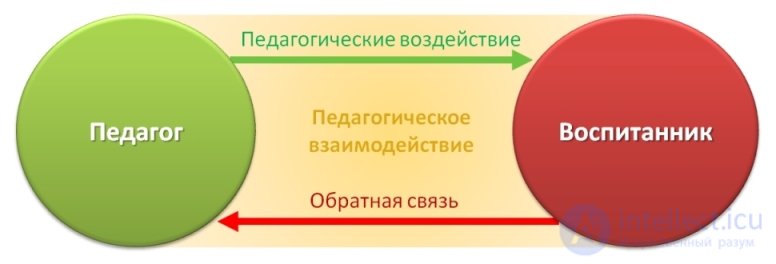
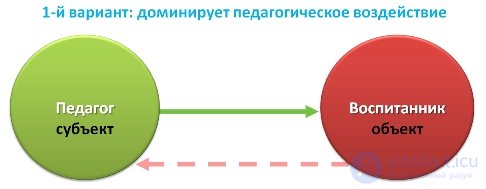
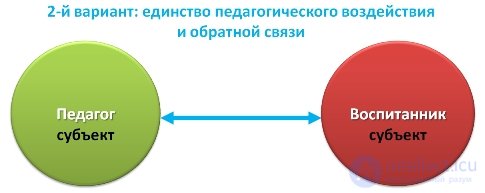
Fig. 3.5. Педагогическое взаимодействие и его основные варианты
In fig. 3.5 схематично изображены основные варианты педагогического взаимодействия.
При первом варианте воздействие выходит на первый план, обратная связь осуществляется эпизодически. Поэтому отношения между педагогом и воспитанником в целом можно охарактеризовать как субъект-объектные, односторонне активные.
Example. При изучении правила педагог демонстрирует образцы, алгоритмы деятельности, а ребёнок их запоминает и воспроизводит. При неправильном воспроизведении педагог разъясняет ошибки, снова демонстрирует образец, а ребёнок снова запоминает и воспроизводит его до тех пока, пока не усваивает данное правило.
Второй вариант отражает единство воздействия и обратной связи в педагогическом действии. Обратная связь осуществляется постоянно, неотделимо от педагогического воздействия. Характер отношений: субъект-субъектный, интерактивный.
Example. Учитель объясняет новый материал в режиме диалога, стимулируя активность учащихся: просит их продолжить мысль, найти ошибку, привести свои примеры. При этом он следит за их реакцией на свои действия, отвечает на их вопросы (в том числе, невысказанные, угаданные по невербальным реакциям).
Педагогические взаимодействия возникают и тогда, когда воспитанники и без участия воспитателей в повседневной жизни вступают в контакт с окружающими людьми и предметами. В этом случае наиболее существенным для отнесения таких ситуаций к педагогическим взаимодействиям являются наличие обратной связи и изменений, происходящих с субъектом-воспитанником.
Идея приоритетности в педагогическом процессе субъект-субъектных отношений была реализована в «педагогике сотрудничества» учителями-новаторами Ш.А. Амонашвили, И.П. Волковым, Е.Н. Ильиным и др. И это неслучайно, поскольку именно сотрудничество (партнёрство) взрослых и детей является ключевым для понимания сущности педагогического взаимодействия.
В основе сотрудничества педагога и ребёнка лежит диалогичность общения, требующая от педагога демократического стиля педагогического управления. По Ш.А. Амонашвили, оптимальным вариантом педагогического взаимодействия при сотрудничестве является повышение статуса воспитанника при сохранении статуса педагога. Это предполагает, что при педагогическом взаимодействии развиваются оба субъекта: педагог помогает детям в их разностороннем развитии, но и дети стимулируют развитие педагога, его самосовершенствование как в профессиональном, так и общечеловеческом плане. Таким образом, реализация педагогического взаимодействия предъявляет более высокие требования к профессионально-личностным качествам педагога, чем реализация педагогического воздействия.
Благодаря педагогическому взаимодействию наиболее успешно развиваются инициативность, способность строить свои действия с учётом действий партнёра, понимать эмоциональные состояния участников совместной деятельности, способность добывать недостающую информацию в диалоге, готовность предложить свою помощь и план общего действия, способность к мирному разрешению конфликтов,
Возрастосообразность – свойство педагогического процесса, которое заключается в том, что обучение и воспитание следует осуществлять в соответствии с особенностями возрастного развития ребёнка.
In pedagogical thought, an understanding of the need to take into account the age characteristics of students and pupils has long been formed. So, Ya. A. Komensky justified the principle of nature conformance - following the nature of man, his age characteristics. Consider the age characteristics of children called J. Locke, IG Pestalozzi, I.F. Herbart and other outstanding teachers of the past.
Age features are a complex of physical and psychological properties characteristic of most people of the same age.
Features of age are manifested in the aggregate of many conditions, among which stand out ...
- requirements for a child at this stage of his life;
- his relationship with others;
- the nature of the knowledge and activities that he learns;
- the prevailing methods of learning and experience;
- особенности различных сторон физического развития ребенка (например, особые условия, обусловленные перестройкой организма в подростковом возрасте).
Каждый период возрастного развития – это качественно особый этап, который характеризуется совокупностью многих изменений, определяющих своеобразие структуры личности ребенка на данном этапе его развития. В педагогике принята следующая периодизация возрастов (табл. 3.1).
Table 3.1
Педагогическая возрастная периодизация
|
Возрастной период |
Возраст ребёнка |
Ведущий вид деятельности |
Важные новообразования |
|
Младенческий |
0-1 год |
Непосредственное эмоциональное общение . Посредством этого общения формируются действия, сопровождаемые и в какой-то мере регулируемые зрительными, слуховыми, мышечно-двигательными и прочими ощущениями. |
Формирование потребности в общении с другими людьми и определенное эмоциональное отношение к ним. |
|
Раннее детство |
1-2 years |
Предметно-орудийная деятельность . Ребенок овладевает способами действий с предметами в сотрудничестве со взрослыми. |
Развитие речи и наглядно-действенного мышления. |
|
Дошкольный |
3-6 лет |
Игровая деятельность (ролевая игра) . В игре ребёнок овладевает разными видами действий, отношений, усваивает принятые в обществе нормы и правила. |
Стремление к общественно-значимой и общественно-оцениваемой деятельности, что характеризует готовность ребенка к начальному обучению. |
|
Младший школьный |
7-10 years |
Учение . В процессе учения формируется память, усваиваются знания о предметах и явлениях внешнего мира и человеческих отношений. |
The arbitrariness of mental phenomena, the internal plan of action, reflection. |
|
Secondary school (teenage) |
11-14 years old |
Communication (communicative activity). Communication takes place in the system of socially useful activities (educational, organizational, labor, etc.). |
Formation of self-esteem, a critical attitude towards others, the desire for adulthood and independence and the ability to obey the norms of collective life. |
|
Senior school (early adolescence) |
15-18 years old |
Educational and professional activities. Educational activities become selective due to the preferences of the child in the field of professional and personal self-determination. |
Worldview, professional interests, self-awareness, dreams and ideals. |
One example of age-related pedagogical process can be the use of illustrative material in the educational process. As an illustrative material in primary school, colorful illustrations are most often used; in the upper grades, structural-logical schemes and tabular forms of the systematization of educational information are used. This is immediately evident even when comparing textbooks issued for grades 1-4 and 10-11.
The need for age-specificity is also due to the presence of sensitive periods in the development of the child.
The sensitive period of development is a period in a person’s life, the most favorable for the formation of certain psychological personality traits and behaviors. In other words, during a sensitive period, a certain personality trait is best and easiest formed. For example, sensitive periods of speech development are between one and a half and three years old [3] . If after this time the speech is not developed enough, then the development of speech will be associated with great difficulties, and it is likely that this pedagogical omission will not be overcome.
For centuries, the pedagogical process was based on knowledge as the main value of education. The mastery of knowledge was a basic indicator of the result of training and education, and the formation of practical activity was considered as learning the experience of applying knowledge in practice. This approach to the construction of the pedagogical process is called knowledgeable . However, in the 2nd half of the XX century. knowledge acquired at school began to lose its value, which was due to the increased availability of diverse information. This is especially clearly manifested in our time against the background of informatization and the rapid development of the media. Nowadays, knowledge, on the one hand, plays an important role in scientific, technical and social progress, on the other hand, it has ceased to be an absolute value of education, and their place has been taken by an active self-developing personality, capable of finding, processing and applying knowledge in various practical situations. activities.
The change in the value basis of education has led to the need to introduce a new concept that reflects the integral ability of an individual to solve the tasks facing her, incorporating the knowledge and experience accumulated by humanity, assimilated by the individual and transformed in accordance with its individual characteristics. Competence has become such a concept - the general ability of an individual to successfully accomplish certain tasks, determined by the specifics of the activity being carried out. The approach to the construction of the pedagogical process as a process of the formation of competence has become known as the competence approach.
Competence - the concept of a general, covering all activities and the whole range of tasks solved in it. To concretize the content of competence in relation to certain types of activities in the competence approach, the concept of competence is introduced.
The concept of competence is relatively new. In the scientific literature the following essential features of competencies are highlighted.
1. Competence relates to the field of skills, not knowledge. “Competence is a common ability based on knowledge, experience, values, inclinations that are acquired through training. Competence is neither knowledge nor skill; to be competent does not mean to be a scientist or an educated person ” [1] .
2. Competence is formed as a result of conscious activity. To master the competence of the student must become a subject of activity.
3. The nature of the competences depends on the context of the activity - the specific circumstances. "To be competent" means to be able to apply the knowledge and experience gained in a given situation. Therefore, the formation of any competencies requires such conditions in which these competencies are manifested.
4. Competence develops, starting from the initial level.
5. Competence has a multilateral, diverse and systemic nature, it develops as a result of the integration of knowledge and skills.
The ratio of the concepts of competence and competence by most authors is defined as follows:
competence is the result of mastering competences; A person’s competence may be more or less high, depending on how much competence he or she has and what is the level of their possession;
competence - an element of competence associated with the solution of a particular task or class of tasks; when designing competence, competences serve as structural units, "bricks", from which the competence of a certain direction and the required level is built;
the more complex ("multitasking") activities, the preparation for which is carried out in the pedagogical process, the more complex the structure of competence and the more numerous and diverse competences that need to be mastered.
There are several approaches to the classification of competencies.
A number of publications highlight key, basic and subject-specific competences.
A.V. The farm subdivides key competencies into ...
value-semantic;
general cultural;
educational and cognitive;
informational;
communicative;
social and labor;
competence of personal self-improvement.
The basic competences of the subject of educational activity [2] include:
emotional psychological (curiosity, trust in teachers, the ability to show emotional stability during stress, etc.);
regulatory competences (responsibility for the results of studies, the ability to determine the objectives of educational activities, concentrate on studies, make general conclusions, etc.);
social (ability to exercise tolerance for other opinions and attitudes, for cooperation, for rendering assistance, ability to work in a group, etc.);
educational and cognitive (the ability to learn, find the causes of phenomena, independently perform tasks, identify errors, etc.);
creative (the ability to make decisions in different situations, to generate other ways to solve the problem, to find other sources of information, to express their needs and interests);
competence of self-improvement (the ability to apply knowledge and skills in practice, to benefit from the experience gained, to exercise self-control and self-development, etc.).
Subject competences are due to the characteristics of each of the subjects.
1. How is the multidimensionality of education?
2. Name the components of the pedagogical process.
3. Give examples of interactions occurring in the pedagogical process.
4. How do the concepts of pedagogical impact and pedagogical interaction correlate?
5. What is the content integrity of the pedagogical process?
6. What is the organizational integrity of the pedagogical process?
7. What is the age of the pedagogical process?
8. What age periods of personal development are distinguished in general pedagogy?
9. What is the difference between knowledge and competence-based approaches to the construction of the pedagogical process?
10. Explain the difference between the concepts of competence and competence .
Comments
To leave a comment
Pedagogy and didactics
Terms: Pedagogy and didactics